 W
WThe Loyal Nine were nine American patriots from Boston who met in secret to plan protests against the Stamp Act of 1765. Mostly middle-class businessmen, the Loyal Nine enlisted Ebenezer Mackintosh to rally large crowds of commoners to their cause and provided the protesters with food, drink, and supplies. A precursor to the Sons of Liberty, the group is credited with establishing the Liberty Tree as a central gathering place for Boston patriots.
 W
WAbigail Adams was the wife and closest advisor of John Adams, as well as the mother of John Quincy Adams. She is sometimes considered to have been a Founder of the United States, and is now designated as the second first lady of the United States, although this title were not used at the time. She and Barbara Bush are the only two women to be married to one U.S. president and the mother of another.
 W
WDavid Ames (colonel) served as first superintendent of the Springfield Armory in Springfield, Massachusetts from 1794 to October 31, 1802. He supplied the American army with shovels and guns during the American Revolution and was commissioned in the militia. Upon completion of service at the Armory, he entered the paper-manufacturing business and by 1838 was proprietor of the most extensive paper manufacturing operation in the United States.
 W
WCrispus Attucks was an American whaler, sailor, and stevedore of African and Native American descent, generally regarded as the first person killed in the Boston Massacre and thus the first American killed in the American Revolution. Historians disagree on whether he was a free man or an escaped slave, but most agree that he was of Native American and African descent. Two major sources of eyewitness testimony about the Boston Massacre published in 1770 did not refer to him as "black" nor as a "Negro"; it appears that Bostonians viewed him as being of mixed ethnicity. According to a contemporaneous account in the Pennsylvania Gazette, he was a "Mulattoe man, named Crispus Attucks, who was born in Framingham, but lately belonged to New Providence, and was here in order to go for North Carolina."
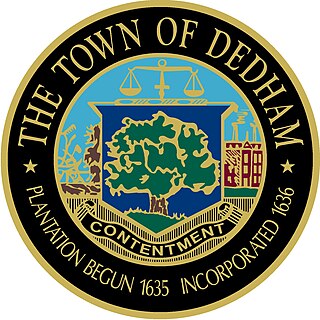 W
WDavid Brown (1740–1812) was convicted of sedition because of his criticism of the United States federal government and received the harshest sentence for anyone under the Sedition Act of 1798 for erecting the Dedham Liberty Pole.
 W
WAsa Clapp was an American merchant and politician.
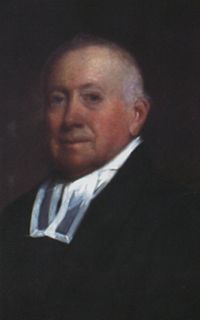 W
WManasseh Cutler was an American clergyman involved in the American Revolutionary War. He was influential in the passage of the Northwest Ordinance of 1787 and wrote the section prohibiting slavery in the Northwest Territory. Cutler was also a member of the United States House of Representatives. Cutler is "rightly entitled to be called 'The Father of Ohio University.'"
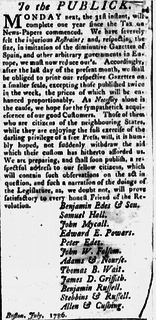 W
WBenjamin Edes was a journalist newspaper publisher and revolutionary advocate before and during the American Revolution. He is best known, along with John Gill, as the publisher of the Boston Gazette, a colonial newspaper which sparked and financed the Boston Tea Party and was influential during the American Revolutionary War.
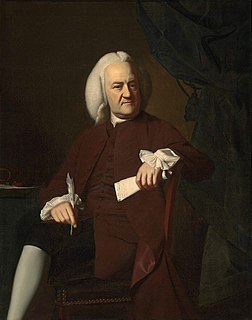 W
WEzekiel Goldthwait (1710–1782) was a wealthy businessman and landowner in colonial Boston, Massachusetts. He was one of the foremost citizens and prominent in the town's affairs in the years leading up to the American Revolution.
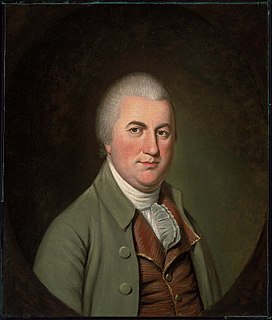 W
WNathaniel Gorham, his first name is sometimes spelled Nathanial) was a politician and merchant from Massachusetts. He was a delegate from Massachusetts to the Continental Congress and for six months served as the presiding officer of that body. He also attended the Constitutional Convention, served on its Committee of Detail, and was one of the signers of the United States Constitution.
 W
WPrince Hall was an abolitionist and leader in the free black community in Boston. He founded Prince Hall Freemasonry and lobbied for education rights for African American children. He was also active in the back-to-Africa movement.
 W
WJonathan Haradan was a privateer during the American Revolution.
 W
WAgrippa Hull (1759–1848) was a free African-American patriot who served as an orderly to Tadeusz Kościuszko, a Polish military officer, engineer and nobleman, for five years during the American Revolutionary War. He served for a total of six years and two months. After the war, he received a veteran's pension. It was signed by George Washington, and he treasured it for the rest of his life. Born free in Northampton, Massachusetts, in 1759 in the middle of the Seven Years' War, Hull became the most significant black landowner in Stockbridge, where he lived after the Revolutionary War. He lived to the age of eighty-nine.
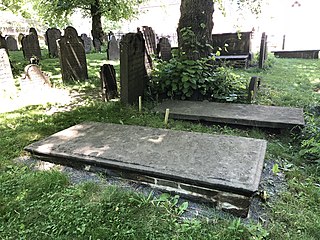 W
WBenjamin Kent (1708–1788) was Massachusetts Attorney General (1776-1777) and then acting Attorney General during much of Robert Treat Paine's tenure (1777-1785). He was appointed seven successive terms. Prior to the American Revolution, Kent was notable for his representation of slaves suing their masters for their freedom, which contributed to the demise of slavery in Massachusetts. He was a member of the North End Caucus and prominent member of the Sons of Liberty, which formed to protest the passage of the Stamp Act of 1765. The efforts of the Sons of Liberty created the foundation for the Boston Tea Party. Kent called for independence early in the American Revolution.
 W
WPerez Morton was a lawyer and revolutionary patriot in Boston, Massachusetts.
 W
WJames Otis Jr. was an American lawyer, political activist, pamphleteer, and legislator in Boston, a member of the Massachusetts provincial assembly, and an early advocate of the Patriot views against the policy of Parliament which led to the American Revolution. His well-known catchphrase "Taxation without Representation is tyranny" became the basic Patriot position.
 W
WThe Boston Massacre was a confrontation on March 5, 1770, in which British soldiers shot and killed several people while being harassed by a mob in Boston. The event was heavily publicized by leading Patriots such as Paul Revere and Samuel Adams. British troops had been stationed in the Province of Massachusetts Bay since 1768 in order to support crown-appointed officials and to enforce unpopular Parliamentary legislation.
 W
WJoseph Peabody was a merchant and shipowner who dominated trade between Massachusetts and the Far East for a number of years.
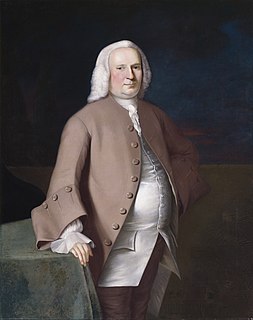 W
WJames Pitts (1712–1776) was a Massachusetts merchant and an early American Patriot.
 W
WSamuel Prescott was an American physician and a Massachusetts Patriot during the American Revolutionary War. He is best known for his role in Paul Revere's "midnight ride" to warn the townspeople of Concord, Massachusetts of the impending British army move to capture guns and gunpowder kept there at the beginning of the American Revolution. He was the only participant in the ride to reach Concord.
 W
WJosiah Quincy II was an American lawyer and patriot. He was a principal spokesman for the Sons of Liberty in Boston prior to the Revolution and was John Adams' co-counsel during the trials of Captain Thomas Preston and the soldiers involved in the Boston Massacre.
 W
WJohn Rowe (1715–1787) was a property developer and merchant in 18th century Boston, Massachusetts. As a merchant, John Rowe's most famous cargo was the tea that played a starring role in the Boston Tea Party. As a developer, his name is remembered to this day in the name of Rowes Wharf, a modern development in downtown Boston on the site of his original wharf.
 W
WBenjamin Russell was an American journalist, born in Boston.
 W
WPaul Dudley Sargent was a privateer and soldier in the Continental Army during the American Revolutionary War.
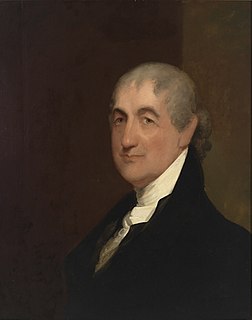 W
WCaleb Strong was an American lawyer and politician who served as the sixth and tenth Governor of Massachusetts between 1800 and 1807, and again from 1812 until 1816. He assisted in drafting the Massachusetts State Constitution in 1779 and served as a state senator and on the Massachusetts Governor's Council before being elected to the inaugural United States Senate. A leading member of the Massachusetts Federalist Party, his political success delayed the decline of the Federalists in Massachusetts.
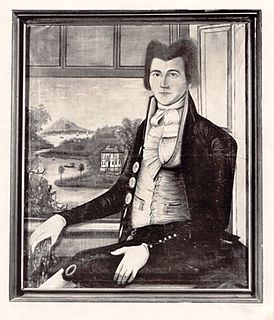 W
WTimothy Swan (1758–1842) was a Yankee tunesmith and hatmaker born in Worcester, Massachusetts, USA. The son of goldsmith William Swan, Swan lived in small towns along the Connecticut River in Connecticut and Massachusetts for most of his life. Swan's compositional output consisted mostly of psalm and hymn settings, referred to as psalmody. These tunes and settings were produced for choirs and singing schools located in Congregationalist communities of New England. Swan is unique as an early American composer in that he composed secular vocal duets and songs in addition to sacred tunebook music. The tunebook, New England Harmony is a collection of his sacred music compositions, while The Songster's Assistant is a collection of his secular music. Swan was also a poet and teacher of singing.
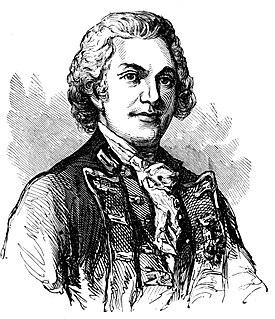 W
WSilas Talbot was an officer in the Continental Army and in the Continental Navy during the American Revolution. Talbot is most famous for commanding USS Constitution from 1799 to 1801. Silas Talbot was a member of the Society of the Cincinnati of the State of New York.
 W
WIsaiah Thomas was an American newspaper publisher and author. He performed the first public reading of the Declaration of Independence in Worcester, Massachusetts, and reported the first account of the Battles of Lexington and Concord. He was the founder of the American Antiquarian Society.
 W
WJohn Warren was a Continental Army surgeon during the American Revolutionary War, founder of the Harvard Medical School and the younger brother of Dr. Joseph Warren.
 W
WMercy Otis Warren was a poet, playwright and pamphleteer during the American Revolution. During the years before the American Revolution, Warren published poems and plays that attacked royal authority in Massachusetts and urged colonists to resist British infringements on colonial rights and liberties. She was married to James Warren, who was likewise heavily active in the independence movement.
 W
WPhillis Wheatley Peters, also spelled Phyllis and Wheatly was the first African-American author of a published book of poetry. Born in West Africa, she was sold into slavery at the age of seven or eight and transported to North America, where she was bought by the Wheatley family of Boston. After she learned to read and write, they encouraged her poetry when they saw her talent.